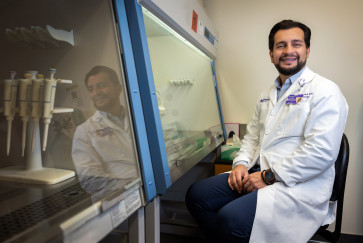Northwestern epidemiologist Mercedes Carnethon testified virtually before the U.S. Senate July 21 at the hearing on “The COVID-19 Pandemic and Seniors: A Look at Racial Health Disparities.”
Carnethon is the Mary Harris Thompson Professor and vice chair of preventive medicine and professor of medicine in pulmonary and critical care at Northwestern University Feinberg School of Medicine. She was part of a small expert panel to help senators better understand the challenges and identify meaningful solutions.
The focus of the hearing was on COVID-19’s disproportionate health impacts on Black and Latino seniors, as well as seniors from other racial and ethnic minority communities.

For Carnethon, it’s personal. As she told the senators, “My research has described an earlier onset and a more severe course of hypertension, diabetes, heart and lung disease among Blacks, Latinx, Native American/Pacific Islanders and some Asians subgroups as compared with non-Hispanic whites.
“I never met my maternal grandmother, because when she was 62 years old, she suffered a stroke followed by a fatal heart attack. While I knew and loved my paternal grandmother, she did not know me for the last 10 years of her life because she battled vascular dementia following years of high blood pressure.
“The relevance of my story is that the vascular diseases that affected my grandparents are the same conditions that are associated with the worst outcomes from COVID-19.”
At the hearing, Carnethon made several recommendations to mitigate the impact of COVID-19 on minority older adults, based on her experience as a populations science researcher.
Visual cues through telemedicine
“Expand the digital infrastructure and training available to older adults to support videoconferencing for telemedicine. Almost half of all older adults have a Smartphone with video capability, and ownership is similar by race and ethnicity. Accessibility is one step, but…technology-naïve adults require training to maximize these technologies. When patient and provider can ‘see’ one another, providers have visual cues to gauge whether in-person visits or other home-based supports are needed.”
Spread NIH resources
“The National Institutes of Health (NIH) needs additional financial support to address the short- and long-term manifestations of the SARS-CoV-2 infection. The majority of the $1 billion infusion of support to the NIH through the CARES Act went to the National Institute of Allergy and Infectious Diseases to accelerate study of the virus and vaccine development. The SARS-CoV-2 infection damages multiple organs, including the heart, lung, blood, kidneys and brain. Further, adults who are obese and have diabetes have the worst outcomes — underrepresented minorities and older adults are overrepresented in those populations. Other institutes at the NIH need to be on equal footing when it comes to the allocation of resources.”
Who gets the vaccine? Who wants the vaccine?
“We need to engage the communities who have been hardest hit by COVID-19 as we develop strategies for prevention and treatment. Progress towards a vaccine to prevent COVID-19 is encouraging. However, drawing on parallels from the annual flu vaccine, nonwhite and ethnic minorities are less likely to get vaccinated than non-Hispanic whites. Without building rapport and trust in these communities, there is no guarantee the highest-risk populations will get the vaccine or they will even want the vaccine.”

